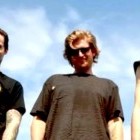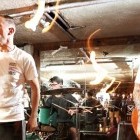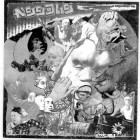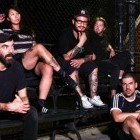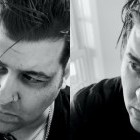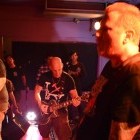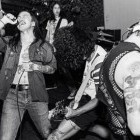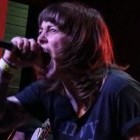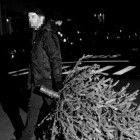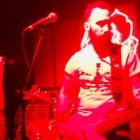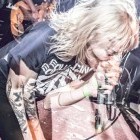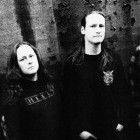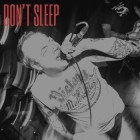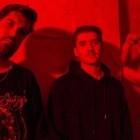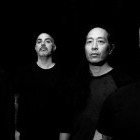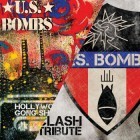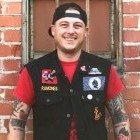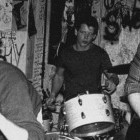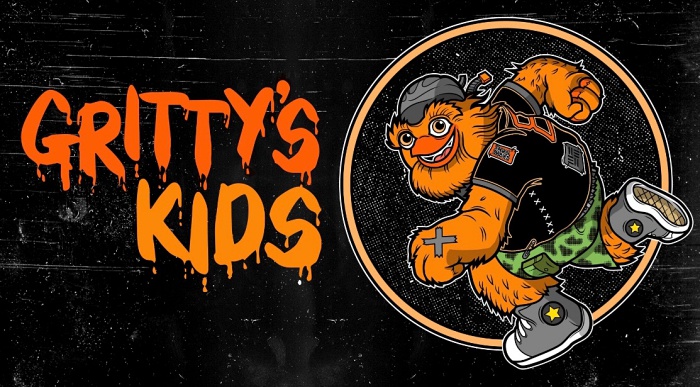
Salute, Krimpets of No Echo! This the Gritty’s Kids interview with Philadelphia hardcore Adonis, Joseph Gough. Joe was born in the Lawncrest neighborhood of NE Philly in the mid-'70s and has been one of the city’s most stalwart hardcore punk guitarists since his BMX and hardcore worlds collided. Over the past couple decades, he’s pounded his guitars like jac... I dunno, like some kind of pneumatic drill used to break through asphalt or rock or something, in: Kill the Man Who Questions, The Sound of Failure, Distress Signal, Heathen Reign, War Emblem, Pink Coffins, and, with your humble narrator, in Toska.
Gough is now doing, to my mind, his most powerful and meaningful work in: Disappearances and Solarized. He is at once a hardwearing and benevolent presence who’s always a pleasure to hang and thrash with.
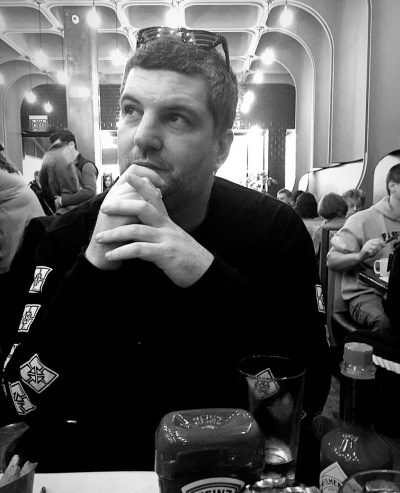
One day, you’re hair spraying your Mushroom Grips, and the next you pick up an axe and it’s like "Oh boy, a firecracker went off in my hand!" I had a Diamond Back and a dirt track behind the Y a couple towns over (you know, so I could walk away from injuries that I now wake up to) but my crossover was more through skating. How’d it happen with you and BMX, and in what order? Also, were you one of those Wildwood boardwalk BMX kids in the late-'80s?
[Laughs] I wish I had some kind of eureka moment, but both interests evolved organically and concurrently for me. I had a 20” BMX bike when i was way too small to ride it. I was too short to touch the ground, so I would have to stand on a curb or somebody’s front step and kind of caveman drop to get started. When i wanted to get off, I would just come to a stop and bail. My dad grew up in the '60s, so I grew up raiding his record collection for Beatles, Stones, Kinks, The Who, and Neil Young records. Music and bikes have always been constants for me. As I got older, bikes and music were things I explored on my own; just looking for the biggest set of jumps or whatever.
Likewise, when I started getting my own musical tastes, it was all '80s thrash metal and loud “alternative” bands. That kind of stuff. The real connection between the two (for me) was also organic, because in the early '90s, as I got away from heavy metal and alt rock and way into DIY punk bands, the BMX industry had been in a recession, and a lot of funding for sponsorships and contest series and magazines dried up. So guys like Mat Hoffman, Chris Moeller, Rick Moliterno, and Ron Wilkerson started their own bike companies, contests, magazines and stuff. Riders were doing zines in their local scenes. Those guys were like the Ian MacKayes, Kent McClards; the Dischord or Ebullition of BMX. As a kind of lonely outsider, it just all made sense to me. Anything good or worth doing, you just had to figure it out for yourself and get it done.
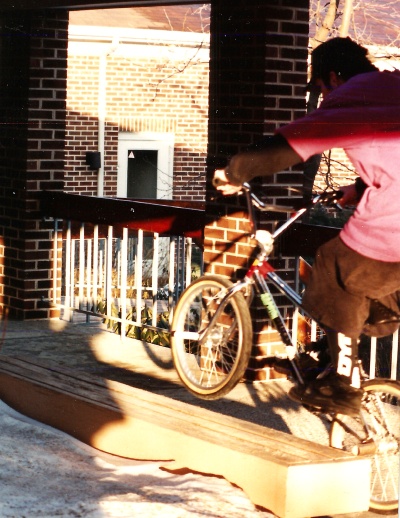
When you were digitizing my '90s NJHC VHS tapes (which, I confess, were actually a few seconds of a show from Jon Hiltz’ basement followed by dozens of hours of Mama’s Family), we had a conversation about the sociology of various Philadelphia neighborhoods and the impact gentrification has had on ethnic enclaves in Philly, NYC and NJ. I’m wondering if your upbringing in NE Philly paved the way for the point of view you had as an adult, or whether you feel that punk influenced your values and convictions in a lasting way. Can you give me some perspective on The Far Northeast, and what you referred to as the “patriotic loutishness” you were treated to as a kid?
Well, I grew up in a white working-class area. My dad was a union guy, worked for Bell Telephone/Verizon from the time he got out of high school until he retired. Everybody worked, did sports at the Lawncrest Rec, went to the 4th of July parade. I think I didn’t have to confront racism or xenophobia in myself or others because we lived in an insular little community. I mean, we were taught, you know, racism is bad, Hitler was bad, MLK was good. You’re Irish and people were racist against the Irish once too, so don’t be racist to others. But that’s all easy when you live in a few square miles of other white people just like yourself. And people started to move when the demographics of the neighborhood began to change. We moved too.
People saying, “Oh, the neighborhood is… changing” (a really loaded word). So, getting older, leaving the neighborhood and stuff, you get exposed to other kinds of people; other kinds of ideas. I definitely credit the punk scene and the ideas it exposed me to with at least putting me on the right path, but I also feel like there are a lot of those shitty repressive ideas in the punk scene too. There are a lot of middle aged punks who turned out to be shitty bigots. I’m not trying to say that I’m cured of all the shit that’s ingrained in our society. I just think we all have to make a conscious effort for the rest of our lives to reject all that shit and deprogram what is impressed upon us at an early age. So, I credit punk with pointing me in the right direction, but also the good people in my life for keeping me in check and leading by example.
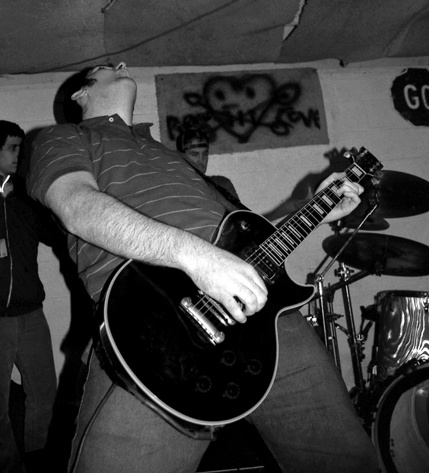
Bands we’ve been in have played shows together for nearly 20 years, from the time The Sound of Failure and The Scarlet Letter did a show in a New Brunswick (NJ) basement in 2000 or so. I know we were both at some Stalag 13 shows in West Philly in that era, but I didn’t know you on a personal level, then. What was your relationship with the DIY scene in Philadelphia and how does it compare to your experiences these days?
Oh you know, I have a lot of friends I’ve made from over the years of going to punk and hardcore shows, but I kind of always felt a little seperate from everybody else. My family moved to Bucks County right in the middle of my junior high years, so I was kind of seperate from everybody else. I made friends and all, but all the kids I knew had known each other since they were in kindergarten. I bounced from friend group to friend group, and my interests had a lot to do with it. I was really into metal, and that was not cool in the burbs when we moved there. Music was really important to how I perceived my identity and stuff. Then, in high school, I got more and more into punk and hardcore music and I cycled through friends (people who were into drugs, or weren’t into drugs, etc.). I had a lot of problems with depression and acting out on that, so I was kind of difficult to deal with.
I always felt kind of separate from people, like I was on probation. Even in terms of punk and hardcore, all my friends were into a lot of pop punk type of stuff, and I just wanted to be in some Youth Crew situation like the pictures on a Chain of Strength or Youth of Today record [laughs]. Getting into the DIY scene, doing bands, and booking shows were things I felt I could make my own luck in; ways for me to be a part of something. Start a band, book a show, move into some shitty house and have my own shows, you know? But, I still felt kind of apart from everybody. I still do, but I think it has more to do with how I’m wired. So, I’m not close to a lot of people. I have a few close, longtime friends, and a solid support network of a few people I can lean on and vice versa. I have always kind of felt like an alien outsider sent here to report back on the goings on. Except, I did a shitty job and just hung out and played in a bunch of bands.
One of the weirdest shows I’ve ever seen you play was the Pink Coffins show outside Mad Mex (the post-show spot in the late-'90s at which many of us were too excited to eat clumpy tofu sour cream) about 10 years back. Did you have a 64 oz. margarita, or are you one of those killjoys plagued by “dignity” and “a modicum of self-awareness?”
You know, that was a weird show. I remember we were all really stoked to get free vegan tacos. That was the agreement to play the show- We would get all these tacos. Like... 100 tacos? I can’t remember. And nobody believed we would get the tacos, but the staff brought us out like a whole catering tray of vegan tacos, like hundreds of them, and we just stood there by our gear shoving tacos into our faces. People were trying to get our tacos but we felt that we had earned them, and we got pretty defensive about not sharing. And then we had to play all bloated with tacos. somebody threw a whole big restaurant bag of tortilla chips into the “pit” which was like 3 nerds circle pitting. Just a waste, really. That’s my recollection of that show. We got a whole tray of tacos.
Disappearances have always thrown me a beating, but there were at least three distinct lineups that each had their own momentum. The first time I saw you, George Grimaldi from Cop Problem was doing some brutal, Mörser-style vocals. Then, he moved to bass and our Joe-tagonist, Cap’n Crossed Out Vocals, did double duty. Then, George seemed to have lopped off one of his legs with a hay sickle, and you became a 3-piece with Andreas Chronis (who was with you in War Emblem. The band has always had you and drummer Scott Monaghan (who plays guitar in the mighty HIRS Collective) and always sounded like a massive conglomerate of fast, early-'80s hardcore and power violence. Is any of that true?
Yea mostly… When we started out, Andreas was on guitar, and we had our friend Andrew playing bass. Andrew had a lot going on and really couldn’t commit, so George covered the bass and we split vocals between he and I. George also had a lot going on and he had to step out of the picture as well, so Andreas was on bass and I was doing all the vocals for a while, but it was stressing me out. So, we got our awesome friend Noel Petrie to come do vocals, and she has been doing an awesome job. We are finishing up a new recording and I can’t wait to get it out there, because it’s been a few years (and lineups) since the first tape, and I really want to show the progression of our sound.
There’s still kind of a power violence influence in terms of song to breakdown ration, speed and brevity of songs, but there are a lot more influences at play, and Noel’s vocals and lyrics bring a whole different perspective. Bands we were talking about when writing and recording the songs were '90s bands like Deadguy, Jesuit, Botch, Ottawa, and Combatwoundedveteran. I don’t really get the '80s hardcore influence but I do love early Agnostic Front and Cause for Alarm. I would say that '90s bands like Born Against, Econochrist, Citizens Arrest, and Rorschach are way more of an influence than anything from the '80s. But really it doesn’t sound like any of that stuff. It never sounds like the bands you want to sound like.
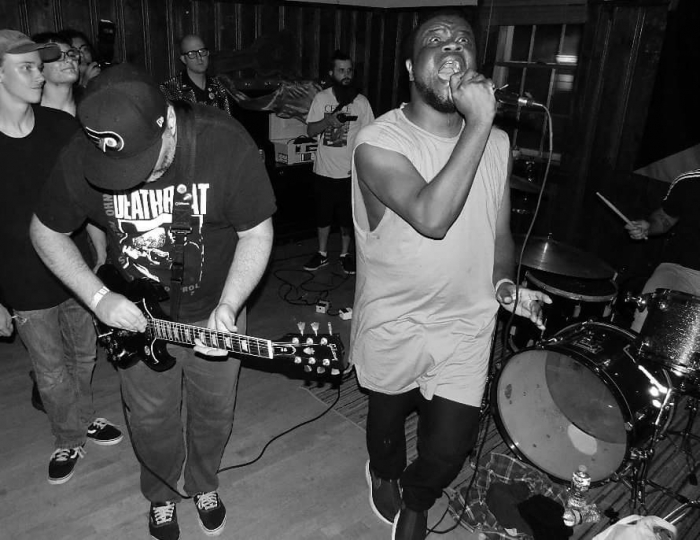
I honestly don’t know how to introduce Solarized. I tried to break it down to band comparisons and how uniquely disquieting it is to see you all do it, but I couldn’t find a place to shelve all the components that make you a band. Everyone is a force. Jeff (ex-Affirmative Action Jackson and Armalite is a slamming drummer who’s got hamstrings like animals. Amber (ex-Downtrodder), is a ferocious bassist. Alex is an unreal writer and performer, and you live close to all those Russian supermarkets and have never once brought me some of that good-ass Lithuanian rye bread. I’m definitely not alone in feeling that Solarized is an important band in this city. How do you all move through the Philly DIY scene, and what’s it been like for you, personally?
I just feel really lucky to get to do that band. Alex and me talked for a long time about doing a band, and took a shot once before (with Noel from Disappearances on bass) and it seemed like a kind of dead deal when this thing came together. There have been a lot of fits and starts and member changes, and it all comes with having some wildly different people on board. So I wouldn’t presume to speak for anybody else in the band about how they perceive and function in the scene, but for me, it’s just been amazing to collaborate with everybody involved and to help alex get his voice heard.
There is a lot of change in punk these days, in the '90s we talked a lot about equality and inclusivity but 25 years on a lot of bands and shows are still full of the same white dudes as they were back then. And the newer generation of kids have no need for it, they’re carving out space for themselves, and there are bands like Soul Glo, HIRS, Gaz, and Luxe, and dozens of other bands out there writing a new history.
Playing with Solarized, I get a front seat to all of that. I try to be aware of and respectful of the space I’m taking up, and try to do what I can to lift other voices and experiences to the level that I’ve always had access to.
I know you as someone who can be self-deprecating and wry, but also strident and principled in a way that I don’t see often- particularly in the over 40 hardcore set. Do you feel like it takes more emotional labor to play in bands at our age, or does hardcore regenerate you so you can better manage the rest of the crapola?
It’s both easier and harder, if that makes any sense. We talked about this before, like a couple years ago I was going to a few shows a month. Every other week at least... basement shows and stuff. And I mean it’s funny—I’m a big, old dude with a white beard in some 19-year-old’s basement watching some hardcore band. But, I went back to school and got busy with that and some family obligations and stuff, and maybe I get to a show a month or every other now. I went to see Open City and Tørsö last week, but I had to leave before Tørsö. It was late and my back hurt [laughs]. I’m just not motivated to go see every band anymore. It has to be something that motivates me.
So, as I am less plugged into the scene, it’s harder to make connections and get shows booked, cause I’m just not participating in the scene. I was the same way when i was booking shows at age 20 or 21. If some 42-year-old dude showed up and handed me a demo, I’d be like “get the fuck out of here, cop.” The people booking shows now are helping out their friends, and the people who help them out, and that’s the way it should be. So in that respect it’s harder. Because we’ve made it harder on ourselves by not putting in the effort of being as involved. And of course, everybody is old and cranky and busy, so sometimes you realize you haven’t practiced in 2 months or whatever. But in terms of writing the music and all that stuff, it’s something i’ve been doing so long that it just really feels natural when we run through the set, or write a new song, or record. It’s like riding a bike. *dad joke*
Stephen_Dyer.jpg)
Thanks for being a part of this, Joe. Appreciate you. Any last words until I drop off my Tim Conway Show VHS tap… I mean, She’s the Sheriff VH… I mean, Disrupt shows on VHS?
Thanks for asking me to do this, this is a cool series of interviews, and as a kind of bit player in the scene, I feel real humbled and honored that you wanted to interview me. I guess my last words would be to keep doing stuff. When you stop doing stuff you get old and then you die. And yea, definitely send me some Tim Conway/Disrupt VHS tapes... or “Dorf on Death Metal.” Really, anything!
***
If you're shopping for vinyl, CD, and cassette hardcore titles, head to No Echo's partner store, Reverb LP, to see what they have available. Every purchase you make helps No Echo with site costs.
Tagged: disappearances, grittys kids, kill the man who questions, solarized, toska


